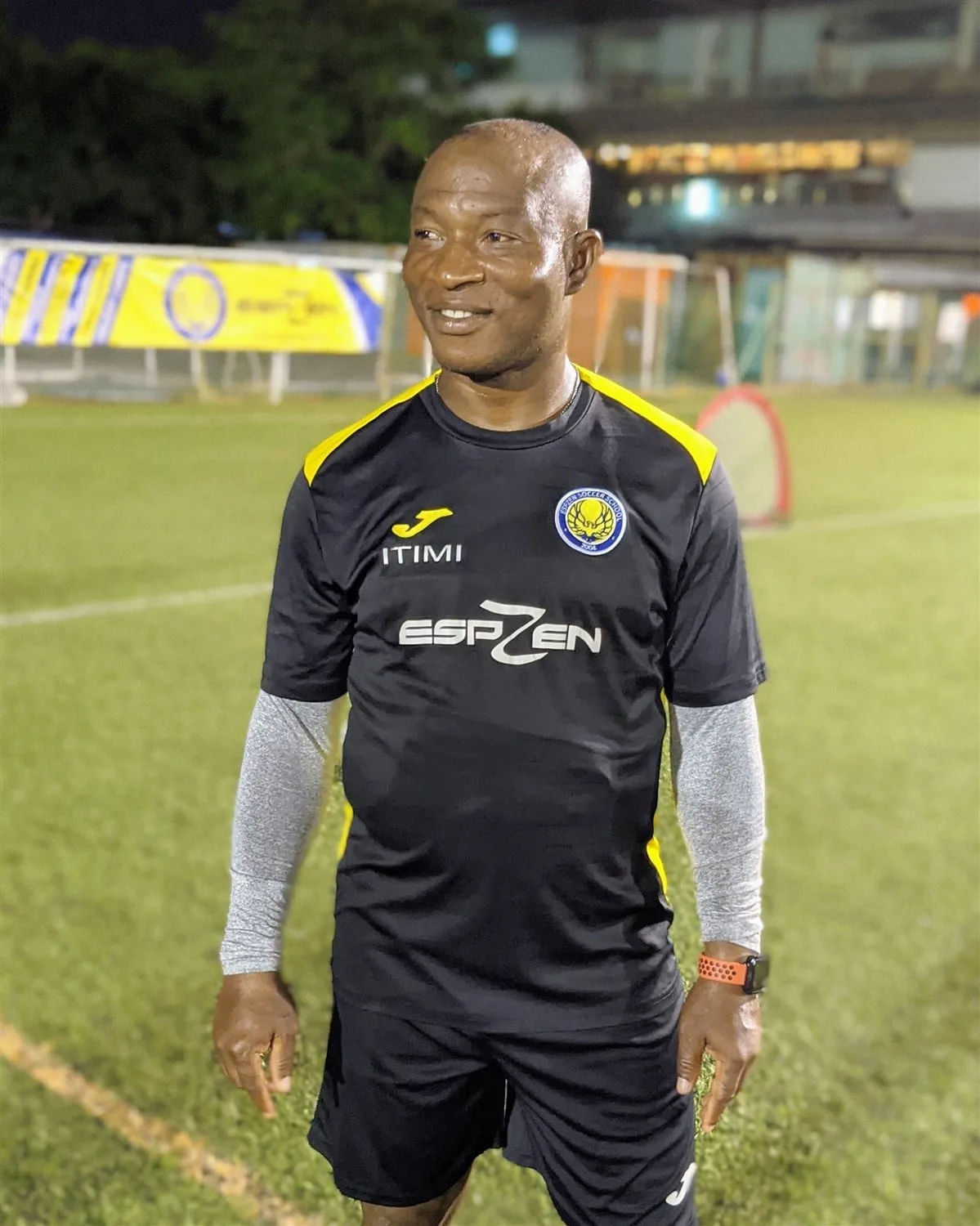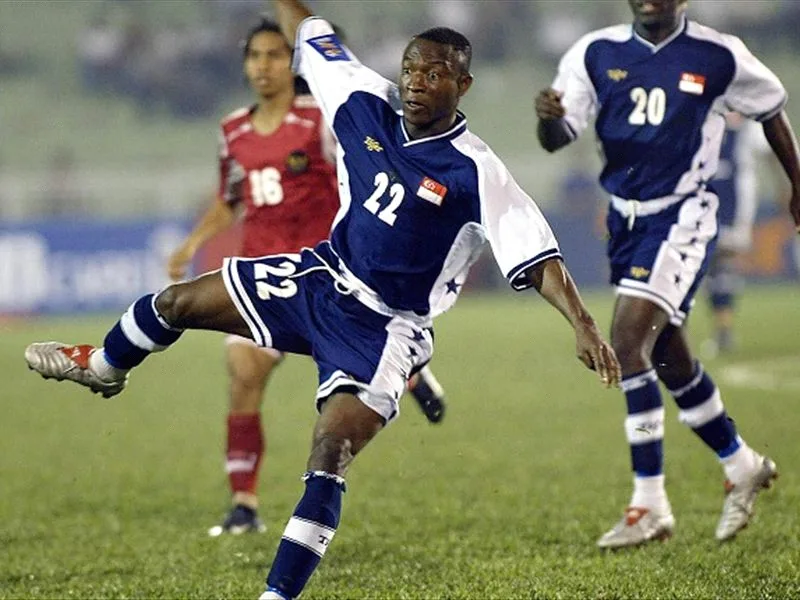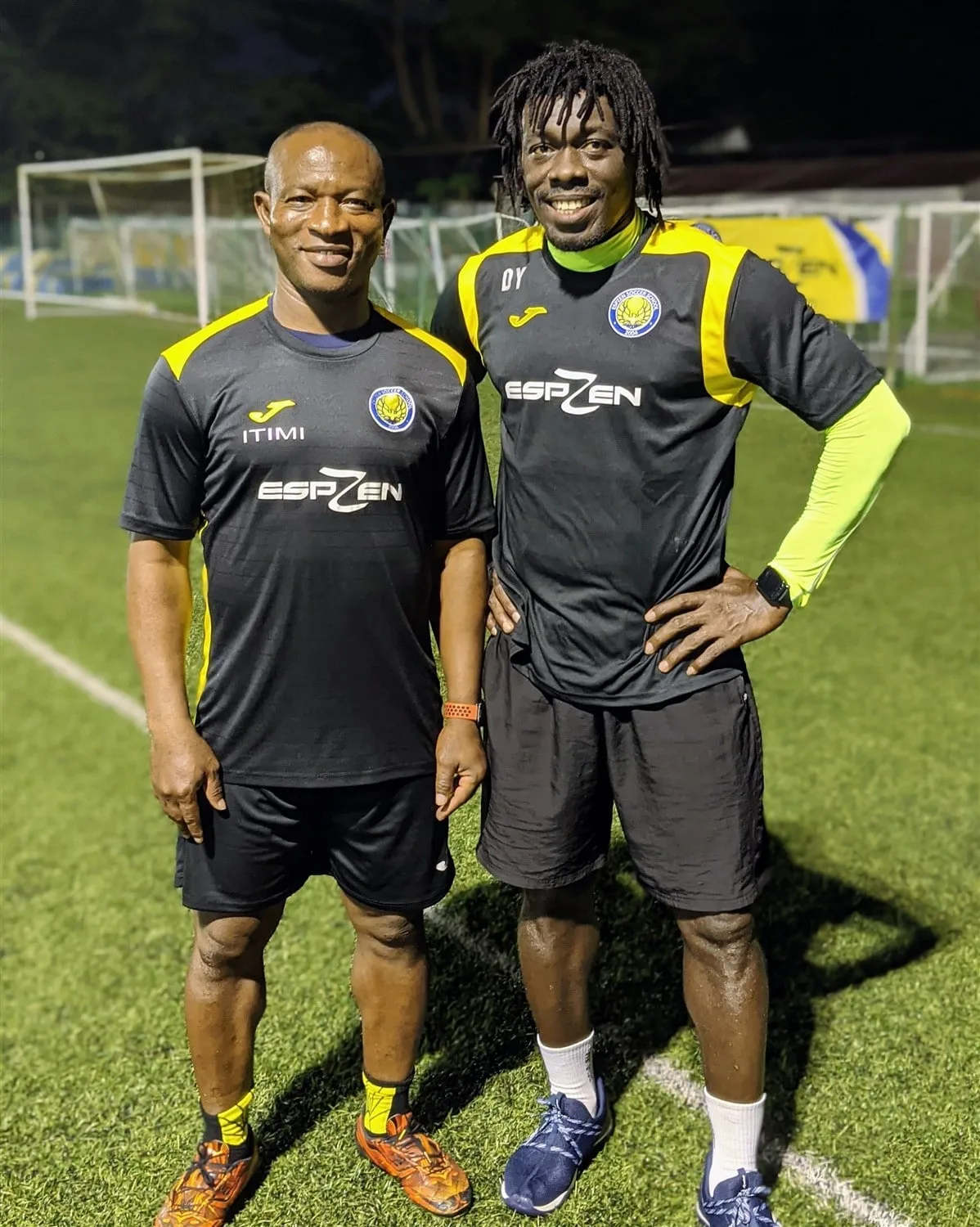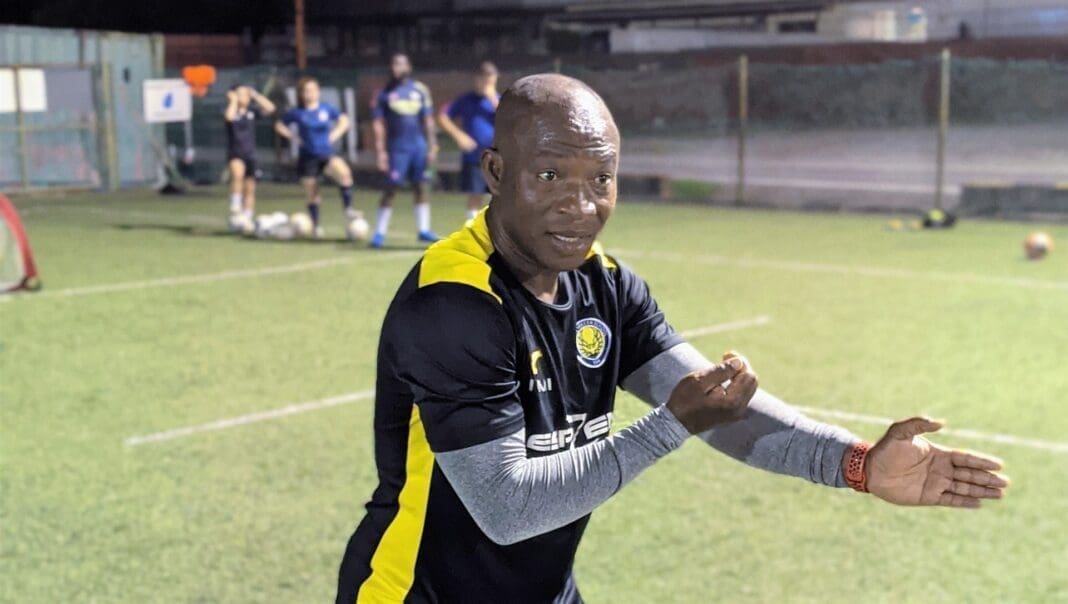A tale of a black footballer in Singapore.
Editor’s note: This article was supposed to launch in October in line with Black History Month. It took us a little longer to get quotes from other interviewees in this article but we hope you can enjoy this article all the same. As with the initial plan to talk about black history, we wanted to shine a light on the black community in little old Singapore. While Singapore is famous for being a multi-racial society, we don’t see many black/African people living here, though the numbers are slowly growing.
Today, we share the story of Itimi Dickson, a Nigerian man who came to Singapore to seek out a footballing career and became a Singapore national team player in the mid-2000s. We hear his side of the story on discrimination in a multi-racial country and his connection with the people there.
Itimi Dickson was only 18 when he came to Singapore in 2001 to carve out a career in football. He was a raw talent but had flair and skills that stood above most players. Three years later, he was offered Singapore citizenship as part of the Foreign Sports Talent Scheme to expand the sporting talent pool and improve the performances of the country in international competitions.
“To live in Singapore, you have to be genuine and good. If you’re good, you live a peaceful life. Singapore gives you an opportunity to everyone to lead your life,” said Dickson.
“But my life wasn’t always good. I faced a lot of challenges in Singapore at the start. I was a young man who had never left Nigeria and here I was, having to stand up for myself, alone in a foreign country,” he shared.
Dickson always loved football. Growing up, his older brother brought Dickson to play with him and his friends. He got better after playing with his brother’s older friends who were twice his size. “I was smaller but I was skillful and better than the players around me, just like my idol Maradona,” mused Dickson. And just like Maradona, he wanted to play in Europe.


“I had friends moving to play in Belgium and Lisbon but the chance never came for me. My older brother asked me one day if I wanted to play in Singapore. I said ‘Why not?’ and I quickly signed for Jurong FC. And I was playing very well,” said Dickson. His coach, legendary Singaporean ex-player V.Sundramoorthy, felt the same too.
“I saw that Dickson was fast and was a great dribbler. He impressed me in the trials and we gave him a contract to see how he fared. He trained with our S-League team and very quickly you saw his ability. We fast tracked him and he started to assist and score goals. There was no turning back for him – Dickson was an automatic regular for me and I couldn’t leave him out,” claimed Sundram.
Sundram and the club did their best to get him settled too. “We take care of all our players. We got him a flat near the training ground. We took him out for meals and his teammates tried to make him feel comfortable – especially as he was missing his family.”
Despite the bright start, problems arose quickly for young Dickson. As a tricky winger, he got fouled often but the abuse escalated quickly. He was kicked, slapped, spat on and was insulted with racial slurs – all during official football matches. “I always asked them why they had to do this to me and their reply was usually ‘Go back to your country’. And that was one of the more polite insults. I understand this was part of the game, to bring me down,” he shared.
It wasn’t limited to opposition players either. Opposition managers got involved too. “(The opposition coach) was throwing racial insults at me during the game and I stopped for about three minutes to tell him that he can’t say those things to me. My coach wasn’t insulting the opposition players so why did he have to do it to me?”
“Referees were not protecting me, nobody listened to me. Even my teammates and manager were not there for me. I felt sold out. Even the way they talked to me, they would make a big deal out of the littlest mistakes. One time, a teammate even dragged my jersey by the neck during half-time because he was not happy with my performance. The other players didn’t get this treatment. I felt it was because I was black.”
“I called Sundram (my manager) in for a meeting to share my challenges. Sundram was a top player and had experience playing overseas. I thought he would understand my challenges trying to settle in. He should know my pain. I was not a troublemaker but I needed guidance. They claimed I was big-headed but I never insulted anyone at the club. I train, I go home and I play well on match day,” shared Dickson.
Sundram had a different take on managing this new found pressure.
“I tried to guide him and have him use his energy to better support the team and be productive. When you’re a good player, it’s expected you get rough treatment on the pitch. The opponent will try to provoke you and a young player can get into the trap of being provoked. What I always tell Dickson was think about what you were going to do on the pitch when you’re provoked. Focus on your game and prove them wrong by scoring and assisting,” said Sundram.
“I don’t recall hearing about the racial slurs but I knew the opponents were kicking him quite a bit. But looking back, if I knew more about this, I would have worked with the management and authorities to help him any way I can,” Sundram added.
And it was this rough introduction to life in Singapore that slowly chipped away at Dickson until one day, he snapped. He striked at an opposition player, Harun Juma’at, and was dealt with an eight month suspension and a $1,000 fine.
Nobody listened to me. Even my teammates and manager were not there for me. I felt sold out. I felt it was because I was black.
“I remember it very clearly. 28 September 2001, and it happened in the 85th minute of the game. It was intense and both teams needed the points. We were losing and chasing the game but Harun punched me in the stomach, and then ran away. Later, he came back to strike me again. At that moment, I lost my cool and I retaliated. It was a bad injury for him and I really used my fist to knock him out. I regret it but that came from many months of abuse that I kept inside of me,” he shared.
“Sometimes when I go to bed, I cry and wonder why I had to go through all this pain. I was young and didn’t know how to communicate and understand my feelings. Sometimes I called my brother and all he would say is ‘Be a man‘.”
Despite all the setbacks, it takes a man of strong will to keep coming back for more. This writer has played against Dickson in casual 8-a-side games in recent years and was blown away by the man’s technical ability, pace and power in his mid-30s. Imagine all of that from a player at the top of his game.


“When I was playing for (my next club) Woodlands, we played against my ex-team, Jurong, and Precious (another naturalised Singaporean from Nigeria) was man-marking me. He was huge and would tackle me hard but I would still get back on my feet. I was taken off 15 times during that game to be treated for bad knocks only to get back in. Precious was telling his manager that he didn’t know what else to do to stop me and he was tired. The more you kick me, the more I will come for you. I scored the only goal in that game. It was a set piece and I scored the winning goal from a header, against Precious. He was 20cm taller than me but I had a good jump.”
Sometimes when I go to bed, I cry and wonder why I had to go through all this pain.
His big break came when Singapore offered him citizenship to play for the national team but with a catch – he had to renounce his Nigerian citizenship. Dickson was conflicted. “The first thing that came to my mind which broke my heart was that I couldn’t play for Nigeria any more. Growing up, everyone wants to play for your country. It’s a big pride to play for your national team.”
“My family wanted me to come back and not lose my Nigerian citizenship. But sometimes, we don’t get what we want. Playing for Singapore was good for my career and over time, I came to love playing for Singapore. Singapore is my home now.”
He started feeling accepted and built good relationships with his teammates. Dickson spoke fondly of rooming with Daniel Bennett and being good friends with striker, Noh Alam Shah, who was no stranger to the odd controversy. The FAS also started clamping down on off-the-ball events where Dickson got hit, with suspensions and fines awaiting anyone looking to give him a cheap shot. In 2004, Dickson was part of the team that won the Tiger Cup for Singapore.
“It doesn’t matter if you’re black or white or any colour. If the player accepts the culture of the place and gives 100%, let them play. This will get the local players to work hard to compete. When we were there, we always worked hard. Great players like Duric came in later because we set the standard with our ability and effort.”
His ex-coach, Sundram, was also very proud of what Dickson has achieved. “Looking back, it was great to have managed Dickson. He was the best thing to have happened to Jurong FC – to get a young, promising player perform and bring joy to the fans. I was proud when he carried the national flag because it is my country too. Our club felt like we have contributed to the country too by developing Dickson.”
Dickson has long retired from pro football and now channels his love for football as a coach for ESPZen Soccer Schools where he works with another Nigerian coach in Dennis Ikogho, our resident coach behind our training features. He feels more accepted today but still gets the occasional stare.


“People still have that look that says ‘Who is this strange black guy?’. My neighbour didn’t speak to me for a year but one day he saw me in the newspaper and said ‘Oh, you are that guy who plays football’. He apologised for giving me looks. It’s not easy to live here when you come from a different background. I’ve had cases where people don’t want to sit next to me on public transport and some even close their nose when going near me. It hurts but fortunately, this doesn’t happen often.”
“Usually when I go out, people come to me and ask how I am and what I’ve been doing. They thank me for playing for Singapore and appreciate what I’ve done. I met a guy on the bus who told me he loved this Nigerian footballer who played for Singapore. He said that the player’s name was Itimi Dickson. I told him it was me and he started crying,” chuckled Dickson fondly.
I came to love playing for Singapore. Singapore is my home now.
“People who discriminate are people who are not exposed (to the wider world). But there are many Singaporeans who are exposed and open minded. These people come and sit with you and talk with you. ‘Where are you from? Nigeria? Wow I’ve been to Africa and I love this place and that.’ These people make me happy to be a Singaporean because they treat you with respect and want to connect with you.”
Today, Dickson maintains a very happy-go-lucky attitude as he takes adult and junior players through training. “We should all join hands together to build a nation. I pray for Singapore because it’s a part me now, and it’s a lovely place to stay.”
“The world is such a small place and we have to be kind to everyone. Can you believe that my neighbour back home in Nigeria is from Singapore?” he added.
Perhaps Singapore and Nigeria have a lot more in common than we think.




Wow, what a nice story to read and tell. God will continue to bless you and keep you safe. Stay safe my brother missing you already here in Nigeria remember our Dec football match that we use to play at Cavajena primary. ????
Great job, bro! It wasn’t easy, but the Waffi spirit kept you going. A person who sees 99 will make sure they reach 100. The Almighty God was your strength, and today, the rest is history.
what a part way to success, your resilience, patience, dedication and determination saw you through, behind every strong man there’s always an hidden tears.
you went, you saw and you overcame, many never saw this coming, note that you are an achiever, I’m proud of you always.